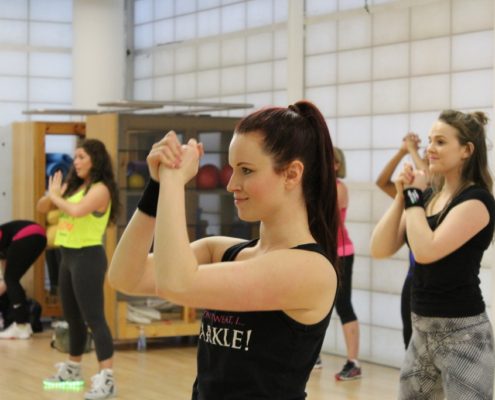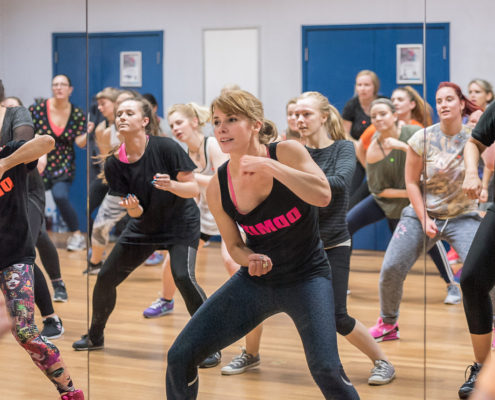Last Updated on July 12, 2019 by Penny Sanders
So, it’s happened. You’re getting fidgety. Your current job just isn’t cutting it anymore and all you think about it is your next group exercise class. But have you ever thought about turning your fitness passion into a career and becoming a group exercise instructor?
A complete career change may seem like a scary prospect but you’re not alone. According to insurance company LV, almost everyone will go through a complete career change at some point in their life. In fact, on average, it is now common in the UK for employees to change jobs every five years, averaging out at around nine jobs in a lifetime. People now look for jobs that offer variety and a freshness, something that staying in the same industry cannot always provide.
One sector that has seen great employee loyalty is fitness. In the 2016 EMD UK Working in Fitness Survey, 36% of fitness sector workers had been in the industry for 10 years or more, with over 62% expecting to stay on at least another five years. So, what does fitness offer that avoids the job hopping culture of today? And why can you take up group fitness as a career if your background is in something completely different?
On a very basic level, becoming a fitness instructor is accessible to everyone as a career. You don’t need a degree and there are a great number of entry level group exercise courses to suit all interests. With a plethora of qualifications out there, finding the right one can seem a daunting task. For someone taking their first steps into a fitness career, we’ve broken down some of the key things you need to know.
Exercise to Music (ETM)
Exercise to Music is a relatively short, Level 2 qualification that equips you with all the tools and knowledge needed to start your career as a group exercise instructor. Taking around two months to complete, including a period of online learning and assessments, the ETM qualification is a great start for anyone looking to get their foot in the door. Anyone looking to become a LESMILLS™ instructor, for example, would benefit from taking the ETM qualification. If you wanted to become a freestyle fitness instructor, this would also be suitable.
Dance Fitness Qualification (DFQ)
Dance Fitness Qualification – like the ETM – is a relatively short, Level 2 qualification. It still provides all the same key knowledge and skills that the Exercise to Music course does, but allows for a dance fitness flair. Chances are, many people wanting to become instructors have attended dance fitness classes and decided to turn their passion into a career. This pre-existing love for the discipline lends itself to a qualification that picks up where their last class left off. Although this is an entry level course, students benefit from having training or experience in the style they would like to teach post-qualification. For example, if you’re looking to become a Clubbercise© instructor then you would benefit from having attended their instructor training prior to the DFQ.
ETM vs DFQ
No, it’s not a Pokémon battle but it is good debate to have with yourself. Is an ETM for me? Is a DFQ for me?
ETM vs DFQ comes down to one specific question; what styles do you want to teach? If you want your participants to exercise whilst music is playing, then take the ETM. Think BODYPUMP™, BODYATTACK™, indoor group cycling. If you want your participants to get fit through dance moves, then take the DFQ. Think FitSteps®, Zumba®, Clubbercise©. If you’re in two minds about which to take, think about which group exercise classes you most enjoy. If you find yourself attending Sh’Bam™ classes on a regular basis, you’re definitely a dance fitness instructor in the making.
On a wider scale, the strength of both Level 2 qualifications is that they open up a world of flexibility. They both provide strong foundations from which to build a successful career in group exercise.
The biggest thing to think about is who you qualify with. Ensure you go with someone reputable and do your research. There are a range of prices out there and timeframes; lowest price and shortest time doesn’t necessarily mean the best option. Look at who your qualification is endorsed by and the awarding body. For example, EMD UK are the national governing body for group exercise and they run ETM and DFQ qualifications. The courses are awarded by Active IQ, recognised by REPs and endorsed by both PD:Approval and CIMSPA. You’re looking for peace of mind for both yourself and your participants.
Is it common to be a freelance group fitness instructor?
Freelance working in general is booming. As of 2016, there were two million freelance workers in the UK, a number that had grown 43% since 2008. Group fitness instructors are contributing to this trend. According to the 2016 Working in Fitness survey, over 61% of female and over 46% of male fitness workers were freelance or self-employed.
Freelancing seems to be the preferred employment method of the modern group exercise instructor, due in part to the freedom and flexibility it provides. Many instructors like to fit their career around their life, meaning they can set their own hours (to some extent) and build their business at their own pace.
This business building flexible approach is another great strength of the fitness industry. With new brands and disciplines being created on a regular basis, the career of a group exercise instructor very rarely goes stale. No truer is this than in the segment of dance fitness. After the Zumba® boom of the 1990s, dance fitness became one of the hottest fittest trends and it hasn’t stopped. It would be impossible to accurately calculate the number of fitness brands currently operating but therein lies the beauty of a career in fitness; there is a style to suit everyone.
Will I change jobs again?
If you’re in the average bunch of UK residents who change jobs every five years then possibly. However, the beauty of fitness is you can have a complete overhaul of interests very regularly and still find things you want to teach. As an instructor, you can make your teaching repertoire as large or small as you like.
Longevity is also a big draw to a career in fitness; it’s one of the very few jobs you can adapt to your lifestyle as you get older. The way we view age is changing rapidly. Gone are the ‘blue rinse brigade’ and, in their place, stand the older adults who put us to shame with their zest for life. From the 101 year old sprinter to the fitness instructors in their 90s, the longevity of fitness shines through.
So, there you have it. The world may be swinging towards regular career changes but group fitness is the ideal choice for job hopping. Chop and change as often as you want but still get paid to do the things you love. In terms of becoming a group exercise instructor, it’s pretty simple; decide what you like, train in your Level 2 and build your career from there. Right then, over to you!
Find all the information you need to launch your group fitness career at www.emduk.org .




